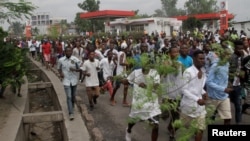U.N. human rights monitors Friday released preliminary findings into violent protests last month in the Democratic Republic of Congo. The U.N. says at least 53 people were killed, nearly all of them at the hands of security forces.
Four policemen were killed by protesters and 48 protesters were killed by state actors, the rights monitors have confirmed.
Human Rights Watch has released similar findings.
“As of now, we’ve confirmed that at least 56 people were killed by security forces,” said Ida Sawyer, DRC researcher for the rights group. … “And we’ve received credible reports of over 30 other victims killed by security forces, and we’re still working to verify those reports.”
Government blames protesters
The government says 32 people were killed in the violence, from September 19 to 21. Security forces clashed with protesters during an opposition demonstration over delayed elections.
The government’s report says most of the violence was carried out by armed protesters. The opposition disputes that claim, as do local and international human rights monitors.
Congolese Minister of Interior and Security Evariste Boshab told reporters that the violence was “a premeditated, and meticulously executed criminal act” by the protesters, and that the government will bring those responsible to justice.
'Justice lifts up a nation'
Meanwhile, in Kinshasa the families of the victims still want answers.
“It is justice that lifts up a nation,” the brother of one those killed told VOA. “When there is no justice, impunity can make people do a lot of things.”
He said he rushed to the scene as soon as he heard his brother had been shot, but his brother’s body had been taken to the morgue. The family went there, he said, but they were turned away, and were told an investigation was underway.
The government later offered his family, and the families of other victims, $5,000 each for funeral costs.
Investigation hurdles
The U.N. and other researchers say investigating the violence hasn’t been easy.
Georges Kapiamba, a human rights lawyer and president of the Congolese Association for the Right to Justice, said health care personnel were told not to share information with NGOs. In most clinics, he added, security agents were there to ensure those instructions were enforced.
Sawyer of the Human Rights Watch says the bodies of some missing people were found days after the events.
“We’ve also documented how some of the bodies that were taken away by the security forces were dumped into the Congo River. … So these practices seem to be an attempt by the security forces to try hide the evidence or make it more difficult for families to organize funerals.”
The prosecutor of the International Criminal Court wrapped up her visit to the Congo on Thursday.
Fatou Bensouda expressed serious concern about last month’s events and called on all actors to exercise restraint.





